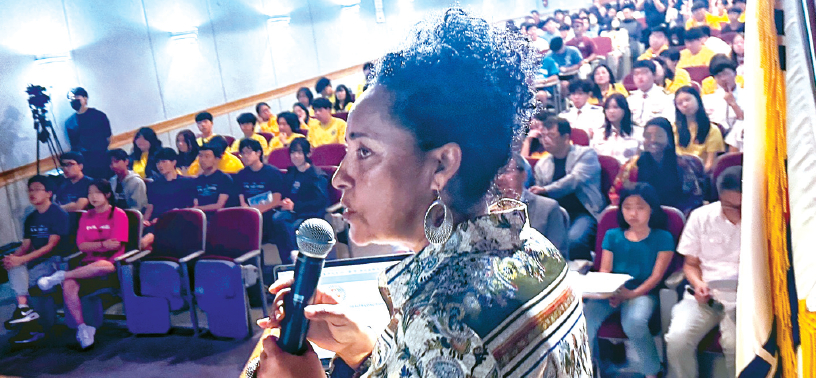
On the morning of October 7, the Consulate General of the Republic of Korea in Los Angeles organized a Youth Forum to Celebrate the 120th Anniversary of Korean Immigration to the U.S. at the Korean Education Center. Over 200 students participated. Guest speakers included Jeff Kim, an Anaheim Unified School District (AUHSD) teacher, Catalina Leff, an immigration attorney from the Latino community, and Senait Admassu, President of the African Coalition.
The event provided students a valuable opportunity to understand the immigration history of the U.S. from three distinct ethnic perspectives spanning over the last century.
Jeff Kim segmented the immigration periods of the Korean community by decades, delving into the unique characteristics and challenges faced by each generation of immigrants.
“As a teacher of Korean American history, I believe it’s crucial for our students to comprehend the experiences of parents who were born in Korea in the 50s and 70s,” said Jeff Kim from LAHSD. “Understanding the narratives of their parents, who witnessed the war, industrialization, and democratization, can deeply enrich their own perspectives.”
“The history of Latino immigration, predominantly as a labor source for the domestic economy, spans over 200 years and still carries with it a legacy of pain and struggle,” expressed Immigration Attorney Catalina Leef. “The rights and well-being of Latino immigrants are still evolving.”
Admassu elaborated, “The notion of blackness extends to South America, Europe, and Africa. The immigration journey for black immigrants was fraught with challenges. The black community remains dedicated to advancing mental health and fostering intergenerational dialogue. We’re eager to exchange our experiences and insights with the Korean community.”
Do Kim, President of the K.W. Lee Center for Leadership, moderated the event by quizzing students about figures like Dosan Ahn Chang Ho, Susan Ahn Cuddy, Charles Kim, and Kim YoungOak. He rewarded correct answers with books about prominent Korean American figures and society.
“Each immigrant community boasts a distinct narrative. Today, the shared bond across the three communities is the invaluable experiences of our immigration forebearers and the wisdom they imparted,” remarked Consul General Youngwan Kim of the Consulate General of the Republic of Korea. “I’m optimistic that events like this will foster unity and understanding among the younger generation.”
The event was sponsored by the the K.W. Lee Center for Leadership, PAVA World, the Unification of Disabled Latin Americans, and the Koreatown Youth & Community Center.
BY BRIAN CHOI [ichoi@koreadaily.com]





